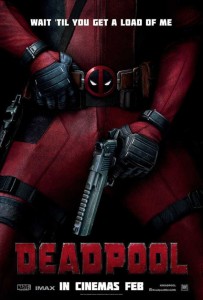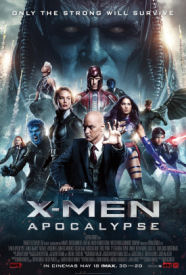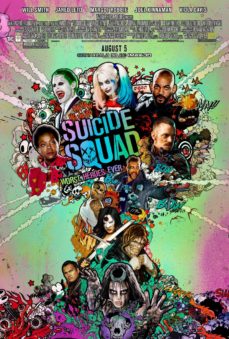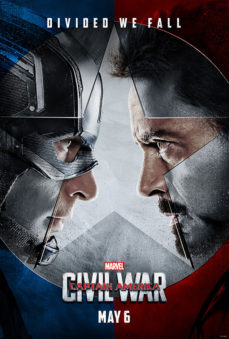 I noticed something this year. There seemed to be less of the “when with the comic book film die” articles in 2016 than there were in years past. I can’t really remember one coming from a major outlet this year, with most articles viewing the genre on its merits and not condemning it for its weakest offerings. The state of the comic book film is one of begrudging acceptance. And thank goodness. Because there were still many hills and valleys that would have encouraged writers to predict the death of the genre in another time.
I noticed something this year. There seemed to be less of the “when with the comic book film die” articles in 2016 than there were in years past. I can’t really remember one coming from a major outlet this year, with most articles viewing the genre on its merits and not condemning it for its weakest offerings. The state of the comic book film is one of begrudging acceptance. And thank goodness. Because there were still many hills and valleys that would have encouraged writers to predict the death of the genre in another time.
 Maybe Deadpool was a shock to the system. If there could have been a comic book film with lower expectations, it was this one. Fox was coming off the disastrous Fantastic Four reboot. It featured a character they had already screwed up years before (you can’t screw up a character nicknamed “The Merc With a Mouth” more than sewing its mouth shut, which is exactly what Fox did to the character in X-Men Origins: Wolverine) and they brought back Ryan Reynolds, who was coming off a string of disappointing films. They gave the film a measly $58 million budget and buried it in February. Sure, the test footage was awesome, but all signs led to disappointment.
Maybe Deadpool was a shock to the system. If there could have been a comic book film with lower expectations, it was this one. Fox was coming off the disastrous Fantastic Four reboot. It featured a character they had already screwed up years before (you can’t screw up a character nicknamed “The Merc With a Mouth” more than sewing its mouth shut, which is exactly what Fox did to the character in X-Men Origins: Wolverine) and they brought back Ryan Reynolds, who was coming off a string of disappointing films. They gave the film a measly $58 million budget and buried it in February. Sure, the test footage was awesome, but all signs led to disappointment.
However, all the naysayers were wrong. Fox giving them a small budget also gave Reynolds and director Tim Miller more freedom with the character. This Deadpool exhibit all the qualities that made the comic book version great–the wisecracks, the self-referential humor, the breaking of the fourth wall, qualities that never would have made it past the suits if there was a $220 million riding on the film. Reynolds went all out in a role he was born to play. And the February release helped as it arrived when not much else was around to challenge it. And the way it satirized the comic book film genre resonated well with the critics. It was a perfect storm that created a smash hit. It has earned $782 million worldwide, setting all sorts of records in the process. Fox now has another mutant franchise on its hands. And while the recent parting of ways with Miller is a cause of concern, as long as Reynolds keeps playing Deadpool the way he played him, the future should be a bright one.
 Not so bright is the future of the flagship X-franchise. In May, Fox released X-Men Apocalypse, the third film set in the days before 2000’s X-Men. It seems almost wrong to call the film a disappointment., considering that at $543 million it is the third highest X-Film of all time, even after you adjust for inflation. But it is the decline in quality that is most disappointing. The film fell into the same mistakes that necessitated the soft reboot of X-Men: First Class, namely including too many characters and a fan-favorite villain from the comics who doesn’t get the respect he deserves from the film.
Not so bright is the future of the flagship X-franchise. In May, Fox released X-Men Apocalypse, the third film set in the days before 2000’s X-Men. It seems almost wrong to call the film a disappointment., considering that at $543 million it is the third highest X-Film of all time, even after you adjust for inflation. But it is the decline in quality that is most disappointing. The film fell into the same mistakes that necessitated the soft reboot of X-Men: First Class, namely including too many characters and a fan-favorite villain from the comics who doesn’t get the respect he deserves from the film.
This puts this wing of the X-franchise at a bit of a crossroads. This film was the last film in the contracts of James McAvoy, Jennifer Lawrence, Michael Fassbender and Nicolas Hoult. All have become much bigger stars since they started their tours of duty in the franchise, and if any are willing to come back, they won’t be cheap. And they probably would only come back if the quality of the films improves. While talk around the release of this film centered on a film set in the 1990s, we e could very well be seeing another reset of the franchise instead.
This year also marked the year Warner Brothers jumped in the shared universe pool with both feet. Too bad both feet were the wrong foot and they were named Batman and Superman. 
This biggest news about Warners’ DC Comics slate wasn’t that Batman v. Superman: Dawn of Justice was a bad film. Oh, it was. Both FBOL Head Honcho Rich Drees and I wrote lengthy reviews about how bad the film was. No, for me, the biggest story was the fanatical blind love DC Comics boosters had for the film. Even though a vast majority of critics were more than happy to point out the many flaws in the film, these fans couldn’t see them. Instead, they accused critics of being paid off by Marvel/Disney for their bad reviews. And after I wrote that article, I was accused of taking payola. I didn’t, of course, but I take a perverse sense of pride of being accused of it. Because I am so far beneath Marvel’s notice that they’d go bankrupt before they got to me.
 However, I am a little disappointed that the people who thought I was rabidly (and well-remunerated) Anti-DC didn’t notice the positive things I said about Suicide Squad. On the other hand, if they did, they’d probably take credit for my “change of heart” or say I was simply trying to curry favor with them to throw them off. Neither are true, but you know how people are.
However, I am a little disappointed that the people who thought I was rabidly (and well-remunerated) Anti-DC didn’t notice the positive things I said about Suicide Squad. On the other hand, if they did, they’d probably take credit for my “change of heart” or say I was simply trying to curry favor with them to throw them off. Neither are true, but you know how people are.
Suicide Squad was simply the better film. It did have faults, but I was more willing to over look them than I was with BvS. because this film was a fun action movie and not one bogged down under its own sense of self importance. It also had charismatic actors playing charismatic roles well. That helped a lot.
Both films took in a lot of bank: BvS earned $873 million worldwide (which Warners considered a disappointment because they were expecting $1 billion or more) and Suicide Squad earned $745 (impressive considering that it didn’t open in China, and major cash source for Hollywood films). The former will be leading us into a whole spate of Justice League films and the latter will create a whole bunch of spin-offs and sequels. I sincerely hope they are worthy of looking forward to.
 While all of this was going, Marvel put out two exceptional films as they do every year. The first was Captain America: Civil War and that film essentially showed Warners how to have your two biggest superheroes fight and manage to make a great movie out of it. The conflict was believable, the villain well-defined and relatable and it introduced a hero or two that would be appearing in a future film. Only it had an extra degree of difficulty of having just about every character that had ever appeared in a Marvel film costar in it without ever losing the plot of seem overcrowded.
While all of this was going, Marvel put out two exceptional films as they do every year. The first was Captain America: Civil War and that film essentially showed Warners how to have your two biggest superheroes fight and manage to make a great movie out of it. The conflict was believable, the villain well-defined and relatable and it introduced a hero or two that would be appearing in a future film. Only it had an extra degree of difficulty of having just about every character that had ever appeared in a Marvel film costar in it without ever losing the plot of seem overcrowded.
Its reward for being the better film was worldwide grosses of over $1.15 billion worldwide. To the victor go the spoils.
However, the sub-franchise is at a similar crossroads as Fox’s X-films are. This was the last solo film Chris Evans was contracted for, and he only has the two Avengers sequels left altogether. I can’t see any one taking over the role as Cap in the future. Evans has stated he’d be willing to come back, but he is likely to be expensive as well. This is something we will need to keep an eye out for in the future.
 The second Marvel film this year was Doctor Strange. By some standards, the film traversed new ground. It is a new and relatively unknown character (the Doctor was the subject of a CBS TV movie in the 1970s, a pilot that never went anywhere) who will be the first of lesser known characters helming solo films. However, some critics have pointed out that the film seems to be part of an easily recognizable formula for Marvel. Some noticed the similarities between Stephen Strange and Tony Stark, as both were arrogant yet successful men who were inspired by life-threatening injuries to become better people and fight crime in the process. There is some truth to that. After all, both characters were co-created by Stan Lee back in a time in comics where familiarity didn’t breed contempt. But I believe that if you are hung up on the similarities and miss the trippy thrill ride that is the film, you’re missing out on something special.
The second Marvel film this year was Doctor Strange. By some standards, the film traversed new ground. It is a new and relatively unknown character (the Doctor was the subject of a CBS TV movie in the 1970s, a pilot that never went anywhere) who will be the first of lesser known characters helming solo films. However, some critics have pointed out that the film seems to be part of an easily recognizable formula for Marvel. Some noticed the similarities between Stephen Strange and Tony Stark, as both were arrogant yet successful men who were inspired by life-threatening injuries to become better people and fight crime in the process. There is some truth to that. After all, both characters were co-created by Stan Lee back in a time in comics where familiarity didn’t breed contempt. But I believe that if you are hung up on the similarities and miss the trippy thrill ride that is the film, you’re missing out on something special.
The film is a success, already earning $652 million and counting. But it will be worth keeping an eye out if the similarity in the Marvel films starts turning audiences away.
 Finally we come to Teenage Mutant Ninja Turtles: Out of the Shadows. The second film of the Michael Bay produced reboot of the Kevin Eastman and Peter Laird creations returned this summer and, well, another reboot might be necessary. While some considered the film better than its 2014 predecessor, it still didn’t earn raves. The film tried to bring a lot of favorite characters from the franchise previous life as a comic book, cartoon and toy line. Typically, when that happens, you don’t get good reviews or good box office.
Finally we come to Teenage Mutant Ninja Turtles: Out of the Shadows. The second film of the Michael Bay produced reboot of the Kevin Eastman and Peter Laird creations returned this summer and, well, another reboot might be necessary. While some considered the film better than its 2014 predecessor, it still didn’t earn raves. The film tried to bring a lot of favorite characters from the franchise previous life as a comic book, cartoon and toy line. Typically, when that happens, you don’t get good reviews or good box office.
The film made $245 million worldwide, which could be considered a disappointment in relation to its $135 million budget. No plans are afoot for a third film in the series, so the next time we see the heroes in the halfshell, it might be in its third revamp in 15 years.
Next year is shaping up as a good year for comic book films. Warners and Marvel with be having a 3 on 3 match for box office dominance, well, 3 if you consider The Lego Batman Movie as a comic book film, as it will join Wonder Woman and Justice League as they square off against Guardians of the Galaxy 2, Spider-Man: Homecoming and Thor: Ragnarok. Hugh Jackman’s possible last go-around happens in Logan and the Smurfs get a computer animated reboot in Smurfs: The Lost Village.




